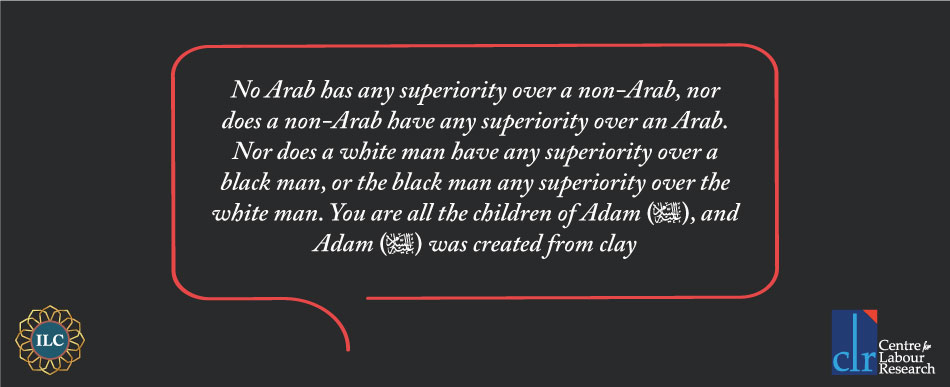Equality and Nondiscrimination

Islam is of the view that all humans are equal, and it does not allow discrimination based on sex, race, origin, religion, and so on. The Quran says, “O mankind! We created you from the same male and female” (04:01, 49:13). It also says the measure of nobility is only taqwa, that is, doing the right deeds and fearing Allah (49:13). Otherwise, all are equal. We find similar thinking in hadith where it is said that “No Arab has any superiority over a non-Arab, nor does a non-Arab have any superiority over an Arab. Nor does a white man have any superiority over a black man, or the black man any superiority over the white man. You are all the children of Adam (AS), and Adam (AS) was created from clay”.[1]
As for gender discrimination, Islam does not restrict women from working and gaining employment. The Quran says that women have the right to work, and they cannot be denied this right: “For men, there is a reward for what they have earned (and likewise) for women there is a reward for what they have earned” (04:32). We find yet another verse in which the Quran says that “Never will I suffer to be lost the work of any of you, be he male or female” (03:195). This verse tells that Islam not only treats women equally at the workplace but also commands the employers not to discriminate in wages and employment on the basis of sex.
We find similar provisions in Sunnah where the first wife of the Prophet (ﷺ), Khadija (RA), was a trader who hired others to carry out trade activities in other countries on her behalf. She also engaged the Prophet (ﷺ) for her trade caravan to Syria on modaraba contract.[2] The Prophet (ﷺ) later on married her. We also find the example of Shifa bint Abdullah (RA)[3] who was so skilled in public administration that Umar (RA) appointed her as a market inspector/supervisor of the Medina Market. She was also the first woman teacher in the early Islamic era.[4] There is also example of a woman, named Rafaydah, who used to treat the injured.[5] Female participation in economic activity was relatively high, and women had even monopolized many occupations in the largest and most market-oriented industry, the textile industry. Shatzmiller (1997) has argued that “The evidence of the late medieval period, 11-15th centuries, indicates women’s participation in the labour market as both considerable and diversified. Their involvement and skills seem to have been more sophisticated and wide-ranging than those of medieval European women. The trades and occupations which Muslim women exercised, the professional and unskilled tasks they performed and the commercial activities and deals in which they were involved, reflect a high degree of participation, specialization and division of labour”.
However, one does not find much mention of women workers in Muslim history. In this regard, as argued by Mitchell (2007), it seems that there was a deliberate erasure of female public activity from the Islamic sources through which more emphasis was placed on male dominance in the economy.
[1] Musnad Ahmad: 22978; al-Baihiqi and al-Bazzaz; A similar narration is found in Musnad Ahmad: 23489
[2] Modaraba contract or agreement, the most prevalent form of trade financing in 6th and 7th century, is till the most preferred form of Islamic financing. It is based on a partnership between the financier or investor (Rabul-Mal) and the working partner (Modarib) where the Modarib manages the financier’s investment in an economic activity. The Prophet (ﷺ) was engaged on a modaraba contract by Khadija (RA). She also paid him more share in the profits than what she paid others.
[3] Webb (2000) quoting al-Isaba fi Tamyiz al-Sahaba by Imam ibn Hajar Al-Asqalani (d. 852).
[4] She was heading the institution of Al-Hisbah (which we will dwell upon more in the section on “role of the state”). Her duties included “making sure that scales were just and accurate, and that transactions were carried out according to the rulings of Islam”.
[5] Adab al Mufrad: 1129
